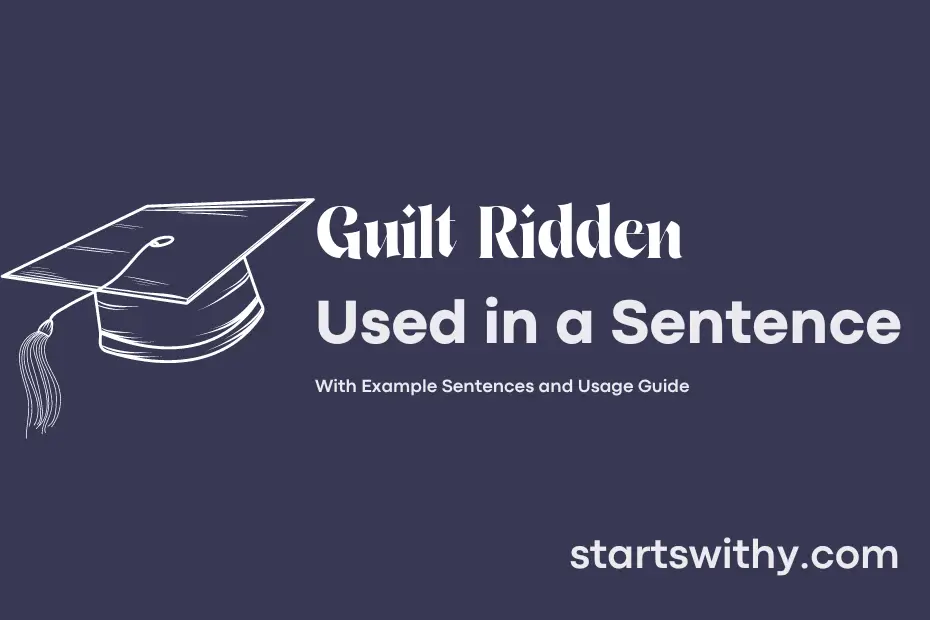Have you ever experienced a feeling of intense remorse and self-blame after doing something wrong? This emotional state, known as being “guilt ridden,” can affect us deeply and challenge our sense of peace and well-being.
“Guilt ridden” describes the overwhelming feeling of regret and responsibility that weighs heavily on our conscience after committing a perceived wrongdoing. It often leads to inner turmoil and can impact our mental and emotional health, making it difficult to move forward or find closure until we address and resolve the source of our guilt.
7 Examples Of Guilt Ridden Used In a Sentence For Kids
- I felt guilt ridden when I broke my friend’s toy.
- He looked guilt ridden after eating all the chocolate without sharing.
- She became guilt ridden when she forgot to do her homework.
- The boy was guilt ridden for not helping his sister with her chores.
- The girl’s face was guilt ridden when she accidentally spilled the paint.
- They both felt guilt ridden for not listening to their teacher in class.
- The dog looked guilt ridden after chewing up the shoes.
14 Sentences with Guilt Ridden Examples
- Guilt ridden after missing multiple lectures this semester.
- It’s hard to focus on studying when you’re feeling guilt ridden about not helping a friend in need.
- I feel guilt ridden for not preparing well for the exams.
- Guilt ridden for skipping gym sessions for the past week.
- After forgetting to submit an assignment on time, I was left feeling guilt ridden.
- Wasting time on social media while having pending assignments left me guilt ridden.
- I am guilt ridden for not attending career counseling sessions earlier.
- Guilt ridden for not returning the library books on time.
- I am guilt ridden for not joining any extracurricular activities in college.
- Feeling guilt ridden for not maintaining a healthy work-life balance.
- Guilt ridden for not participating in the college fest preparation.
- Not keeping up with the coursework left me guilt ridden.
- I am guilt ridden for not utilizing the resources provided by the college effectively.
- Guilt ridden for not attending the guest lecture by a renowned speaker.
How To Use Guilt Ridden in Sentences?
To use Guilt Ridden in a sentence, follow these simple steps:
-
Identify the situation: Think of a scenario where someone is feeling a strong sense of guilt or regret.
-
Choose the appropriate context: Determine whether the guilt or regret is related to a specific action, decision, or event.
-
Include the main word: Make sure to use the term “guilt-ridden” as the main focus of your sentence.
-
Provide a descriptive sentence: Craft a sentence that clearly conveys the intense feeling of guilt or regret being experienced. For example:
- “After accidentally breaking his mother’s favorite vase, he was guilt-ridden for weeks.”
- “She felt guilt-ridden for not speaking up when she had the chance.”
-
Check and revise: Once you have formed your sentence, review it to ensure that it accurately captures the meaning of Guilt Ridden.
By following these steps, you can effectively incorporate Guilt Ridden into your sentences to effectively convey feelings of regret or remorse. With practice, you will become more comfortable using this term in various contexts to express the intensity of guilt being experienced.
Conclusion
In conclusion, “guilt-ridden” is a powerful term that conveys the deep emotional weight of feeling responsible or remorseful for something. It describes the intense sense of guilt and burden that can weigh heavily on an individual. The use of this term in sentences helps to evoke a strong and vivid image of someone grappling with overwhelming guilt or regret.
By incorporating “guilt-ridden” into sentences, writers can effectively communicate the emotional turmoil and inner conflict experienced by individuals who are plagued by feelings of guilt. This term adds depth and complexity to descriptions of characters or situations, making them more relatable and engaging for readers. Overall, “guilt-ridden” serves as a potent linguistic tool for capturing the complexity of human emotions and experiences.



